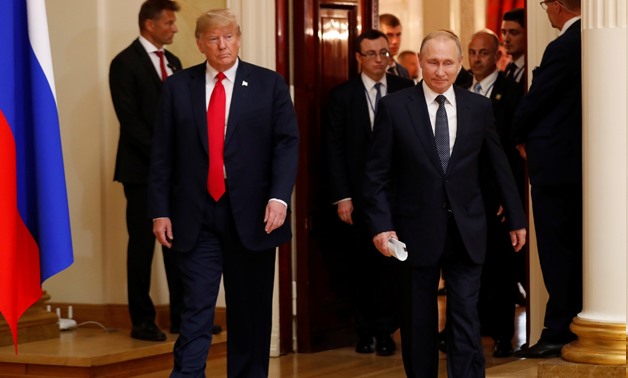
U.S. President Donald Trump and Russia's President Vladimir Putin arrive to hold a joint news conference after their meeting in Helsinki, July 16, 2018. REUTERS/Kevin Lamarque
WASHINGTON - 19 July 2018: The White House struggled on Wednesday to contain the furor over President Donald Trump's heavily criticized summit with Russian President Vladimir Putin, denying Trump ever meant to say that Moscow was no longer targeting the United States.
Trump, facing a political uproar over his failure to confront Putin during their Helsinki summit on Monday over Russia's 2016 U.S. election meddling, adopted his usual defiant posture, calling his critics deranged.
Asked by reporters before a morning Cabinet meeting at the White House whether Russia was still targeting the United States, Trump shook his head and said, "No."
But at a later news briefing, White House spokeswoman Sarah Sanders said the president was saying "no" to answering questions not to the question itself. Sanders said Trump believes the threat from Russia to undermine November's U.S. midterm elections still exists and that Moscow would still target American elections.
"The president has made clear to Vladimir Putin that he should stay out of U.S. elections," Sanders said. "The president and his administration are working very hard to make sure that Russia is unable to meddle in our elections as they have done in the past."
U.S. intelligence officials have said Russia's efforts to undermine elections are continuing and now target the Nov. 6 congressional elections.
It was the second time since the summit that Trump and the White House have blamed a misstatement or misunderstanding for the furor over Russia.
On Tuesday, Trump said he misspoke at a Helsinki news conference with Putin and that he accepted intelligence agency conclusions about Russian meddling, although he hedged by deviating from his prepared notes to say "it could be other people also. There's a lot of people out there."
Trump stunned the world on Monday by shying away from criticizing the Russian leader for Moscow's actions to undermine the 2016 presidential election, sparking bipartisan fury at home and prompting calls by some U.S. lawmakers for tougher sanctions and other actions to punish Russia.
Critics have accused him of siding with Russia over his own country by failing to criticize Moscow for what U.S. intelligence agencies last year described as Moscow's interference in the 2016 election in an attempt to sow discord, aid Trump's candidacy and disparage Trump's Democratic opponent Hillary Clinton.
Putin has denied allegations of election interference.
"We're doing very well, probably as well as anybody has ever done with Russia. And there's been no president ever as tough as I have been on Russia," Trump said before the Cabinet meeting, adding that Putin "understands it and he's not happy about it."
Trump's comments at the White House followed a series of early morning Twitter posts on Wednesday in which the Republican president said his summit with Putin would eventually produce "big results" and accused his critics of "Trump Derangement Syndrome."
"Some people HATE the fact that I got along well with President Putin of Russia. They would rather go to war than see this. It's called Trump Derangement Syndrome!" the president wrote.
U.S. Director of National Intelligence Dan Coats told a congressional committee in February that he already had seen evidence Russia was targeting U.S. elections in November, when Republican control of the House of Representatives and Senate is at stake, plus a host of positions in state governments.
In rebutting Trump's dismissive comments about U.S. intelligence on Monday, Coats said, "We have been clear in our assessments of Russian meddling in the 2016 election and their ongoing, pervasive efforts to undermine our democracy."
Democratic Senate leader Chuck Schumer said Trump's tweets on Wednesday showed he was not committed to accepting the findings of intelligence agencies, and his Tuesday comments were merely damage control.
"The only reason there was a walk-back is that the president was forced by pressure from many of my Republican friends here, from his allies in the media, and his own White House staff," Schumer said on the Senate floor. "But it's clear from today’s tweets he does not mean it."


Comments
Leave a Comment